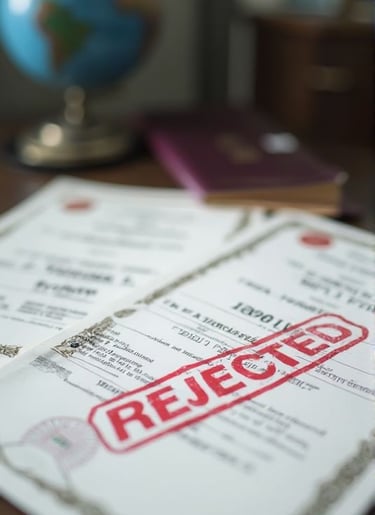The Hidden Risks of Laminating Important Documents for Abroad Jobs
Planning to apply for a job abroad? Learn why laminated documents are rejected by embassies and how to safely protect your original certificates.
ABROAD JOB
Viral Gala
9/18/20252 min read


🚨 The Lamination Trap: Why Protecting Your Documents Can Accidentally Sabotage Your Dream Job Abroad
You worked hard for that degree. You earned that professional certificate. Naturally, when you get your hands on that precious piece of paper, your first thought is, "How do I protect this forever?"
For years, the answer for many of us has been simple: lamination.
It feels responsible. It feels safe. It shields the paper from coffee spills and dog-ears. But if you are currently compiling your documents for a job, visa, or educational opportunity overseas, we need to deliver a critical message: That protective layer is actually the single biggest threat to your application.
Here's why the innocent act of laminating your documents creates serious, hidden risks during embassy and international verification:
1. The Trust Barrier: Why Officials Must See the Original 🚫
Imagine the visa officer. Their job is to prevent fraud. When they look at your document, they aren't just reading the words—they are looking for physical proof of authenticity:
Hidden Evidence: Your document contains hidden safety features: the texture of the original paper, the raised feel of an embossed seal, and the specific ink of a signature. Lamination flattens all of this and hides the critical watermarks.
The Rejection Risk: Because the lamination blocks these visual and tactile checks, many embassies, consulates, and government agencies have a blanket policy: Laminated documents are simply not accepted. This can cause instant delays, or worse, outright rejection.
2. When Paper Needs to be Stamped: The Legalization Deadlock ✍️
Getting an international job or visa means your documents must be legalized. This involves key steps like HRD attestation, MEA (Ministry of External Affairs) stamping, or obtaining an Apostille.
These processes require officials to stamp and sign directly onto the original paper.
If your document is encased in plastic, where does the stamp go? It can't be properly applied, meaning your document cannot be legally validated for international use. Your career-making certificate becomes temporarily invalid. (Learn why this process is required on the Apostille Convention Wikipedia page).
3. The Forgery Fear: Why Lamination Raises Suspicion 🚩
It’s an unfortunate reality, but authorities have to screen for tampered papers. If a document is laminated, it instantly raises a red flag: Was this done to hide an alteration or a change made before the plastic was sealed?
Though you laminated your document with the best intentions, the verification officer may see it as an attempt to obscure the truth. You don't want anything that casts a shadow of suspicion over your integrity.
Your Peace of Mind: Safer Ways to Protect Your Achievements ✨
Your documents do deserve to be protected, just not permanently sealed. You can achieve excellent safety without risking your future opportunity:
Use Sleeves, Not Seals: Invest in high-quality, clear plastic sleeves or sturdy document folders. They shield your papers from damage but allow them to be easily removed for verification and stamping.
Safe Storage: Keep your originals tucked away in a cool, dry, fireproof safe or filing cabinet, and only pull them out when an official process requires the original.
When in Doubt, Duplicate: Carry notarized copies or high-quality photocopies for day-to-day general use, keeping the precious originals untouched.
Don't let an innocent attempt to protect your career achievements accidentally put them at risk. By keeping your certificates in their original, verifiable state, you ensure nothing stands between you and your exciting new life abroad!
Need to reverse a laminated mistake? If your documents are already sealed, do not attempt to peel them yourself! We specialize in safe, laser-based removal to restore document integrity.
Contact Viral Gala, Document Integrity Specialist:
Call/WhatsApp: +91 99203 22366
Lamination Removal Site: https://www.howtoremovelamination.com/
360 VR Photography: 360vrphotography.com and 360vrphotography.in
